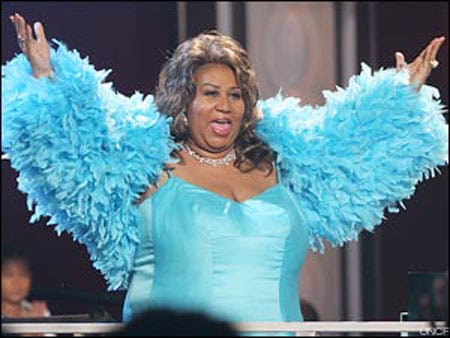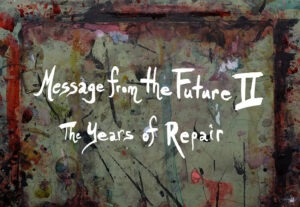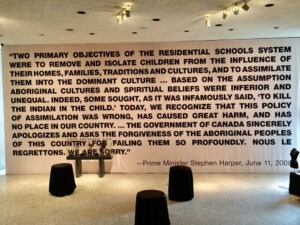
August 16, 2018; Detroit Free Press, Atlanta Journal-Constitution, and Rolling Stone
Aretha Franklin, the legendary “Queen of Soul,” died yesterday of pancreatic cancer. She was 76. As Brian McCollum notes in the Detroit Free Press, “Franklin was the loftiest name in the rich history of Detroit music and one of the transcendent cultural figures of the 20th century. Raised on an eclectic musical diet of gospel, R&B, classical and jazz, she blossomed out of her father’s Detroit church to become the most distinguished black female artist of all time, breaking boundaries while placing nearly 100 hits on Billboard’s R&B chart—20 of them reaching No. 1.” Franklin played her final Detroit show in June 2017 at a concert for thousands at an outdoor festival downtown. In November 2017, Franklin sang in public for the last time, performing a nine-song set at an Elton John AIDS Foundation benefit in New York.
Franklin was born in Memphis in 1942, but moved to Detroit at the age of four, when her father became pastor at New Bethel Baptist Church. Her father, in addition to leading the church, was a nationally known gospel singer. Franklin grew up singing gospel with her father. In 1960, she signed her first record deal. But it was seven years later, in 1967, when Franklin broke through with a range of hits, including “Respect,” “Baby I Love You,” “(You Make Me Feel Like) A Natural Woman,” “Chain of Fools,” and “Ain’t No Way.”
It is hard to overstate Franklin’s musical impact. We will not try to review her musical career here, but many have done so. To pick just one source, see this profile by Dave Remnick in the New Yorker.
But, as McCollum notes, Franklin’s broader social impact “was just as important.” Atlanta Journal-Constitution reporters Ernie Suggs and Shelia M. Poole point out that Franklin grew up in a civil rights movement household.
Sign up for our free newsletters
Subscribe to NPQ's newsletters to have our top stories delivered directly to your inbox.
By signing up, you agree to our privacy policy and terms of use, and to receive messages from NPQ and our partners.
“From 1946 until 1979, as pastor of New Bethel Baptist Church, [her father] was one of the biggest and most influential preachers in America, with his church serving as a civil rights hub.…When Dr. King came to Detroit, many of the black bourgeoisie did not exactly embrace him. But people like her father, who was a grassroots minister, did,” notes Greg Dunmore—identified by Suggs and Poole as a “longtime friend, journalist, and neighbor” of Franklin.
In Rolling Stone, Jamil Smith recalls Franklin’s support of Angela Davis while she was in jail. As Smith explains, “In 1970, as Franklin was nearing the height of her celebrity, the Black Power activist and philosophy professor Angela Davis stood accused of purchasing firearms used in a deadly attempt to help prisoners escape a courtroom in Marin County, California. Davis was an acknowledged Communist, and President Nixon had labeled her a ‘dangerous terrorist.’” Franklin offered to pay the bond for Davis, “whether it’s $100,000, or $250,000.” Ultimately, for logistical reasons, another person posted bond instead of Franklin (and Davis was later acquitted). The statement Franklin made at the time, however, speaks to her vision:
Angela Davis must go free. Black people will be free. I’ve been locked up (for disturbing the peace in Detroit) and I know you got to disturb the peace when you can’t get no peace. Jail is hell to be in. I’m going to see her free if there is any justice in our courts, not because I believe in communism, but because she’s a black woman and she wants freedom for black people. I have the money; I got it from black people—they’ve made me financially able to have it—and I want to use it in ways that will help our people.
At NPQ, we have noted the interconnection of art and social change before. Last fall, jazz musician Sonny Rollins, while establishing a jazz and social justice scholarship fund at Oberlin, noted that the goal is for young artists “to tap into the universal power of a higher spirit, so they can give people what they need.” At least a part of achieving this, as NPQ’s Cyndi Suarez puts it, requires “identifying with resistance movements and figuring out how to link them to the art world.”
Franklin was uncanny in her ability to connect in this way. As Smith remarks, “Her songs are universal, but Franklin became political because blackness is. Because womanhood is. And to borrow from Ossie Davis’s eulogy for Malcolm X, Franklin was our living black womanhood. Her power as an artist was not merely excelling at every single American musical form, but doing so in the cadence of our sisters, mothers and grandmothers.”—Steve Dubb













